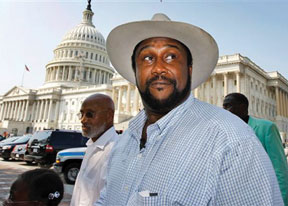 Black farmer lobbyist wants piece of Indian deal
Black farmer lobbyist wants piece of Indian deal
By Matt Volz
The president of the National Black Farmers Association says he’s being stiffed by the attorneys behind a $3.4 billion government settlement with Native American landowners who asked him to lobby Congress to fund the payout.
John Boyd, who spent years championing the discrimination claims of tens of thousands of Black farmers, said he took on the task of pressing reluctant lawmakers to pass appropriations legislation in 2010 that included both the Indians’ settlement and the farmers’ own $1.15 billion deal.
He said he did so at the request of the attorneys representing hundreds of thousands Native Americans who said they were swindled out of the royalties owed to them for more than a century of development on land parcels they owned and the government held in trust. The lawsuit was filed in 1996 by Elouise Cobell of Browning, Montana, who died in 2011.
Boyd complained that the attorneys for the Native American plaintiffs received $99 mil-lion from the settlement, but he never saw a dime.
“Email after email they’re asking me to do this work,” Boyd told The Associated Press. “Who in their right mind is going to do all of this work for free? Nobody. This is America.”
Boyd filed an $8 million law-suit in Superior Court of District Columbia claiming attorney Dennis Gingold and Gingold’s former law firm, Kilpatrick Townsend, unjustly enriched themselves from Boyd’s work and that they breached an implied contract with him.
The Cobell attorneys have moved the case to federal court, where they filed a motion asking a judge to dismiss it. They said Boyd was lobbying for the funding bill’s passage on behalf of the Black farmers, and they had no agreement with Boyd to work for them.
“He claims as an unregistered lobbyist he should be paid for lobbying. As our motion says, we never asked him to do something specific. We asked him to relay what he was hearing,” said Kilpatrick Townsend general counsel Susan Cahoon.
Boyd’s claims also come too late under the three-year statute of limitations, the Cobell attorneys said in their motion.
The farmers’ claims of discrimination by the U.S. Department of Agriculture were settled around the time an agreement was reached in the Cobell case. But reaching a deal was only the first step. Congress had to appropriate funding for the settlements, and court documents said White House officials decided to combine the two settlements and other settled claims into one funding bill.
Boyd said Cobell representatives initiated contact with him to lobby on their behalf and then directed him throughout the process to keep up his lobbying efforts. He documented dozens of meetings he had with individual lawmakers, their staffs and White House officials before the Claims Re-solution Act passed in December 2010.
But court documents filed in the case show there was never any agreement on monetary compensation for Boyd to lobby for the Native Americans. The Cobell attorneys don’t dispute Boyd undertook the lobbying he said he did. But they say several lobbyists were advocating their own claims for the same funding bill.
Boyd’s efforts were driven by the realization that he would be unable to obtain funding for the black farmers’ settlement without the Native American deal passing, too, the Cobell lawyers argued.
“The interests of the Cobell plaintiffs at most were secondary,” the motion to dismiss says.
A federal judge in August 2013 rejected a similar claim by Boyd for compensation from the black farmers’ settlement. In that case, as in this one, Boyd could not point to any agreement about how much he was to be paid, what type of work he was expected to perform, or how many hours he was supposed to put in, the Cobell attorneys said.
Boyd said he reached a monetary settlement with the black farmers’ attorney the same month, but he declined to elaborate.
Besides Boyd’s claims, there are two other unresolved disputes over the $99 million in fees awarded to the Cobell plaintiffs. One involves attorney Mark Brown, who said he worked for six years on the plaintiffs’ behalf and is owed more than $5.4 million. Cahoon said Elouise Cobell terminated Brown’s services.
The other involved the Native American Rights Fund, which worked on the case until 2006, when it began representing tribes that faced a deadline to sue the federal government over trust funds. Cahoon said the group withdrew from the Cobell case because of that conflict of interest.
A federal judge has put $13.6 million of the $99 million in attorney’s fees into an escrow account pending mediation in those disputes.
Cahoon said the attorney disputes won’t affect the disbursement of the settlement to the nearly 500,000 beneficiaries who are awaiting their shares.
